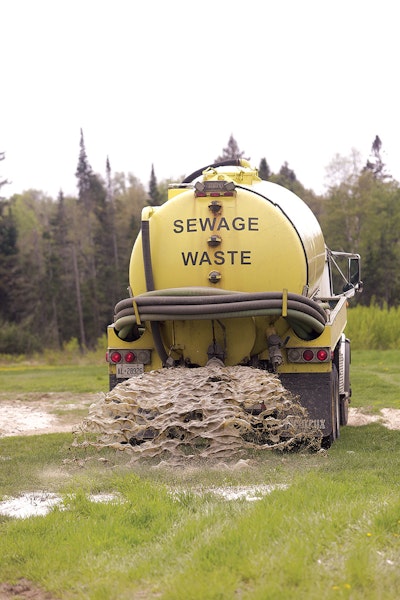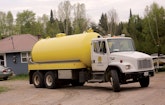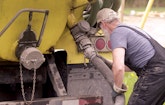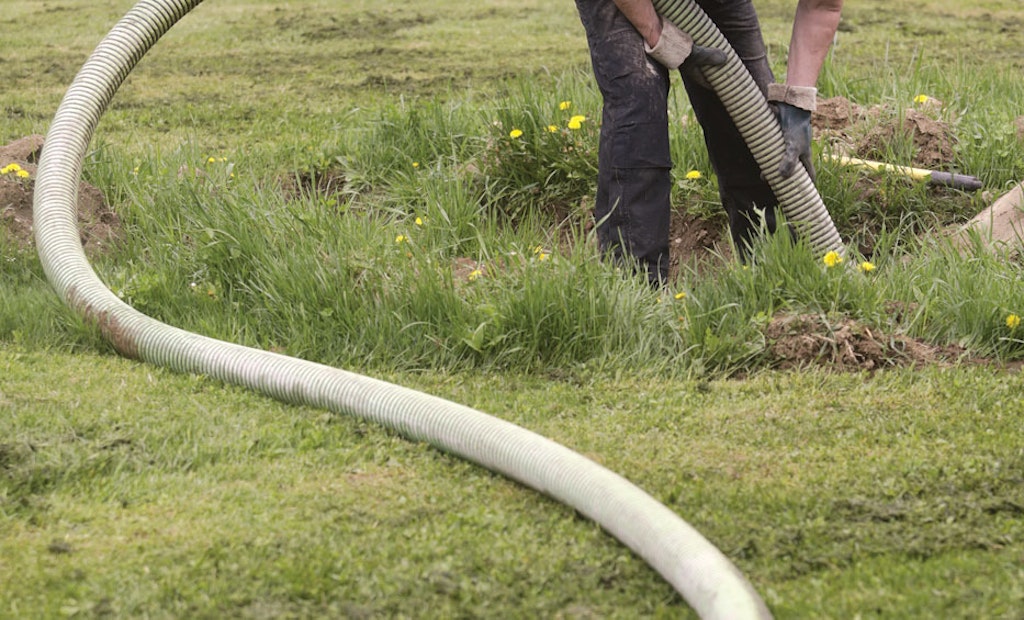Located in a village of 1,100 people in cottage country in central Ontario, Total Site Services has had to diversify and expand its service menu to survive and thrive over more than 50 years.
The resilient, multigeneration, family business started as a drilling and blasting specialist but has recently incorporated a full line of septic services to serve a population that heavily relies on decentralized waste treatment. Along with that change has come a broader image rebranding and a realization of the critical importance of efficient septage disposal.
Based in Haliburton, three hours northeast of Toronto, Total Site Services was founded by Tim Casey who in the 1960s worked contracts ranging from quarrying to roadwork, anywhere from the Arctic to Texas.
“We were spending so much time on contracts far away from home, taking away from family time, so we settled on providing services closer to Haliburton,” recalls Pat Casey, Tim Casey’s son and the current owner and company president.
EXPANSION PLANS
Total Site Services slowly transitioned into a one-stop shop for any site work within an hour’s drive of Haliburton. “We take care of many of the site preparation steps that landowners would otherwise need to call individual contractors to handle,” Pat Casey says. “The name reflects that.”
Septic system installation and pumping began in 2014.
The company remains a family business. Tim Casey still works alongside drilling and blasting crews, pinch-hitting for other departments as well. Pat Casey runs the operation today, and one of his four children, Regan, has already joined as a full-time equipment operator. The others help out when not at school. The business employs between 15 and 30 people, depending on the season.
The ability of employees to pivot quickly from business to business is crucial. Tracey Laframboise, operations manager, has been with Total Site Services since 2004 and is responsible for scheduling work and allocating both equipment and human resources to maintain maximum efficiency in a hectic market.
“Tracey’s work is essential to keep us on top of things,” Casey says. “There isn’t as large a market as there is in the outskirts of the greater Toronto area. We cross-train our people so that they can work on any project. We have to work with the weather, not against it, and we have to be strategic with asset allocation. You never want to see equipment that isn’t busy.”
The company operates two Freightliner septic pumpers, a 2003 and 2004 with 4,100-gallon carbon-steel tanks and Elmira Machine Industries / Wallenstein Vacuum pumps, built out by Vacutrux. A 2004 Ford cube van is used for installations and repairs. A pair of 2017 Ford pickups — an F-150 and an F-250 — are used for sales and service. A 2019 Ford F-150 with electric liftgate comes in handy for septic tank maintenance and repair work. A pair of trailers include a 2006 CAM Superline 20-ton and an 8-ton fabricated in-house, which fills out the lineup for bigger jobs.
Construction equipment includes three Internationals: a 2018 tri-axle with a Beau-Roc dump body, a 2018 tandem with a Bibeau dump body, and a 2005 tandem dump truck. It also includes a 2013 Dodge Ram 5500 with dump box. Four Cat machines round out the construction fleet: a 2017 325 excavator, a 2017 308E2 mini-excavator, a 2008 EC55 mini-excavator, and a 2014 289D skid-steer.
A full-time mechanic handles equipment repairs on the entire fleet, completing about 70 percent of repairs in-house. The company’s shop has recently opened up to perform work on commercial vehicles from other companies.
LAND APPLICATION FROM THE GET-GO
Total Site Services began land-spreading septage straight out of the gate in 2014.
“Septic service had always been part of our long-term plan, and land spreading was always part of the business formula,” Casey says. “When a vacant field came up for sale, we took it seriously and jumped on it.”
The field had once been used by a retired pumper for spreading — one of only two sites in Haliburton County currently approved for applying septage. It’s centrally located within a 10-minute drive of the company’s home base. Land application may be done on 35 acres with flat terrain, sandy and dry soil, which limits puddling on the surface and good absorption.
The closest house to the field is about 1,800 feet away, and most neighbors had already accepted the land-spreading operation. Total Site Services optimized the terrain by further clearing and leveling the field using its own construction equipment. The field was planned to create appropriate treed buffer zones and setbacks from sensitive wetlands. The spreadable area was then planted with grasses, mostly timothy and clover, to take up the nutrients following land application. When the grass matures, Casey cuts it down with a mower.
BEING A GOOD NEIGHBOR
While a few residents were opposed to the application, residents largely voiced their support. In many cases, neighbors rely on the Total Site Services land-spreading operation to keep the cost of septic pumping down. Without the field, hauling distances to the nearest wastewater treatment plants could cause costs to skyrocket.
The company has made good use of about 10 acres of the property, which was approved for 3.6 million gallons of septage per year. In 2017, the company spread a little more than 1.1 million gallons.
In April 2018, the company applied to Ontario’s environment ministry to increase the spreading area to 25 acres. At the same time, Total Site Services also requested that the Municipality of Dysart permit rezoning to construct a four-cell, earthen walled-sewage lagoon lined with clay and geotextile. The lagoon would allow septage to be stored on the property year-round, awaiting land application.
Dysart was amenable to the plan, in part because its own municipal waste treatment plant was already operating near capacity. The Town Council approved the plan in June 2018.
“We want to be good stewards of the land and also good neighbors, so we held an open house in fall 2017 to show residents our operation, how we planned to expand and how a lagoon operation works,” Casey says. “We offered free Tim Hortons donuts and coffee. As it turns out, it was more of an educational event than one in which people expressed a lot of concern.”
BUSY SUMMERS
Total Site Services currently earmarks seven workers for the septic business: three for pumping, three for septic system installations, and a rover who performs septic system inspection and maintenance. From June to the end of September, pumpers are out six days a week and on call 24/7.
“Even with the addition of the 2004 Freightliner, we’re still running 10- to 12-hour days,” Casey says.
Most of the tank systems, chambers, risers and lids the company installs are manufactured by Brooklin Concrete Products. Sewage pumps and grinders are manufactured by Liberty Pumps.
“In some cases, we don’t have enough room to install a full traditional septic system, due to regulations involving setbacks from lakes, creeks and property lines,” Casey says. “In those cases, we’ve been turning to high-efficiency models under the Eljen brand that can be installed on a small footprint.”
The company advertises heavily, from radio ads to roadside billboards to Google and Facebook. The company’s Facebook page highlights interesting customer projects. About 60 percent of pumping customers are seasonal residents who rely on their mobile devices while in the area. Newspapers represent only a small subset of the advertising budget. Total Site Services also exhibits at the Haliburton Home & Cottage Show.
“We keep a careful log of what works by asking customers how they found out about us, and we disperse our advertising dollars in the direction that appears most fruitful,” Casey says.
Total Site Services also recently expanded its branding efforts by supplying all workers with new uniforms.
PORTABLES NEXT?
Looking to the future, Casey is considering adding portable sanitation service to the business. “We realize that it would require a whole new equipment base and considerations of where to dispose of the waste,” he says. “But it would definitely fit into our range of services. We still have ample room for growth under the Total brand.”
A business built on a family legacy
Total Site Services is a family business in more than one way. Both the Casey family homestead and the company’s 45-acre headquarters are located on land owned by the family since Canada was founded in 1867. Company owner Pat Casey’s children will be the seventh generation of the family to live there.
“Our roots are here, and the family has used the land for various businesses and many business cycles throughout the years,” Casey says.
The original settlers were homesteaders but soon opened a lodge nearby. “They were self-sufficient, growing their own food, making their own maple syrup and producing their own honey,” Casey says.
Casey’s father, Tim Casey, and his uncle Dennis started Shamrock Drilling and Blasting in 1965, with the business eventually evolving into Total Site Services.
Casey has four children, Regan (20), Parker (16), Reese (14) and Keira (13). So far, only Regan has joined the full-time work team, but there’s hope that he will one day take the helm of Total Site Services and maintain the family connection to both the business and the land.
“He’s committed to it verbally and he’s in the excavation side of the business right now,” Casey says. “I keep impressing on him that it’s a lot easier to take over an active business than to start a new one.”









